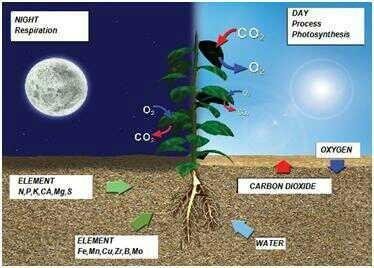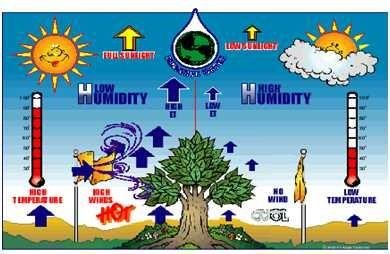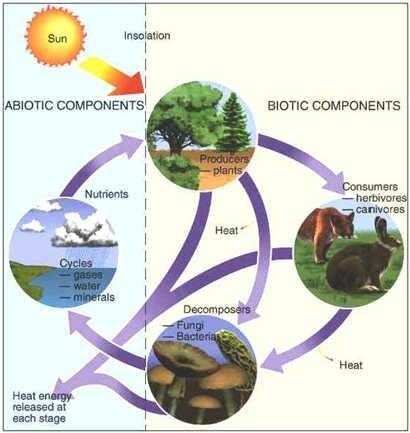Components abiotic is part of ecosystem consists of the factors that are not live around the organism. components abiotic include the Sun, air, water and temperature.

Sunlight Sunlight is the main source of energy for all organisms on earth. **CO2 and water turn into carbohydrates and oxygen during photosynthesis by using sunlight.** Air
air consists of various types of gases such as oxygen, hydrogen, carbon dioxide and nitrogen. All organisms need air for their activities. For example, oxygen is required during respiration that oxides (burn) carbohydrates to produce energy. Plants use carbon dioxide as a raw material for producing carbohydrates and nitrogen to produce proteins.
WaterAll the organisms on earth need water to survive. Plants, as well as animals and humans, will be dehydrated and die if they lack water. In the human body, water serves as a solvent dissolving all the ingredients eaten by the organism. Water is also a habitat for fish and frogs
Temperature
Figure the effect of temperature on humidity. Image of the effect of temperature to humidity, if the high temperature then the humidity will be lower, the higher the air pressure, the wind will be faster, and the less water supply leads to lower ecosystem life and diversity while at a relatively low temperature higher humidity, low, wind the slower the availability of water.
Temperature is one important component for organisms to survive on earth. Every organism needs a certain range of temperatures to survive. Therefore, plants that live in hot areas such as cactus will die or grow badly if they are planted in cold areas and vice versa.

Energy is obtained from the environment. For example, in plants, plants need light, water, oxygen, and carbon dioxide to form nutrients as a source of energy. As for animals for example insects, require the manufacturer as a source of energy. Insects will later be eaten by a higher consumer. This will continue so that there will be a flow of energy and material. This will form a cycle or cycle in a systematic environment. All these processes are also called ecosystems.
Broadly speaking, the components of the ecosystem consists of two components, namely components of life (biotic) and non-living components (abiotik). In an ecosystem there is an interaction between these two components. Both of these components can not be separated and interconnected in an ecosystem and these components are able to affect the changes that occur in an ecosystem. This article will only discuss about the abiotic component while the biotic component will be discussed in the next article.
The abiotic component (the constituent component of the ecosystem) is anything outside of a living being that includes both physical and chemical factors. Abiotic component consists of temperature, water, sunlight, air, rocks and soil, humidity, Altitude and latitude. The abiotic component can affect the biotic components, and vice versa. The following will explain each of the abiotic components in the ecosystem.
Cool text book like article about ecosystems
Downvoting a post can decrease pending rewards and make it less visible. Common reasons:
Submit
Great insights about our ecosystem. It brings back memories on my elementary days. Biology and understanding nature's lifecycle is one of my interests.
Downvoting a post can decrease pending rewards and make it less visible. Common reasons:
Submit